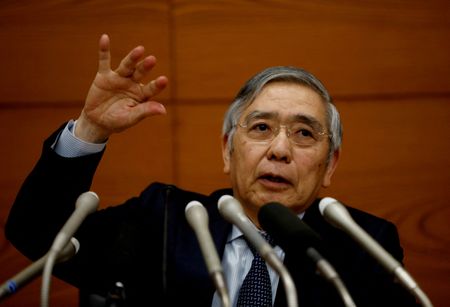By Yoshifumi Takemoto and Leika Kihara
TOKYO (Reuters) -Japanese Prime Minister Fumio Kishida urged companies on Wednesday to achieve wage hikes that exceed the rate of inflation as part of the country’s efforts to put the economy on a sustained recovery path.
Central bank governor Haruhiko Kuroda also piled pressure on companies to hike salaries, saying it would underpin the Bank of Japan’s efforts to sustain prices around its 2% inflation goal.
Their remarks come ahead of annual spring wage negotiations between companies and labour unions, which will be key to how soon the BOJ may dial back its massive stimulus.
Wealth accumulated by companies have failed to trickle down to households via higher wages in the past 30 years, a situation the government hopes to change, Kishida told a news conference.
“I would like to create an economic structure in which wages rise every year,” he added.
Separately on Wednesday, Kuroda reiterated his resolve to maintain ultra-loose monetary policy to sustainably achieve 2% inflation.
“Japan’s economy will likely sustain fairly stable growth,” Kuroda told a gathering of commercial bank executives.
“The BOJ will support the economy with monetary easing, so that its inflation target is sustainably and stably met accompanied by wage growth,” he said.
Japanese long-term interest rates have crept up since the BOJ stunned markets last month by widening the band around its 10-year bond yield target, a move investors saw as a prelude to a future interest rate hike.
Kuroda has repeatedly ruled out the chance of a near-term interest rate hike on the view that wages must rise more for inflation to sustainably meet the 2% target.
The BOJ conducted emergency bond buying operations for a fourth straight session on Wednesday in a show of its resolve to keep yields from rising too much.
But the yield on the 20-year Japanese government bond (JGB) briefly rose to 1.340% on Wednesday, the highest since October 2014, on market expectations the BOJ could phase out stimulus when Kuroda’s term ends in April.
Core consumer prices in November rose 3.7% from a year earlier and analysts expect inflation to remain above the BOJ’s 2% in coming months, hitting households that have yet to see wages rise much and stoking fears of a consumption downturn.
Japan’s umbrella labour union has decided to demand a 5% pay hike in this year’s spring wage negotiations, which, coupled with a tightening job market and repeated calls by government to raise wages, is pressuring firms to lift salaries.
(Reporting by Yoshifumi Takemoto and Leika Kihara; Additional reporting by Tetsushi Kajimoto; Editing by Jacqueline Wong)

